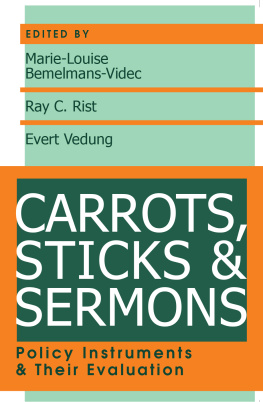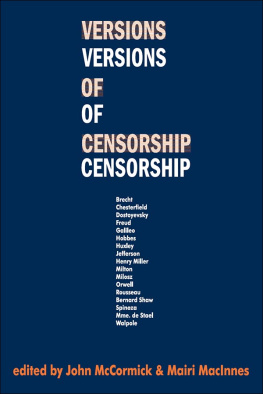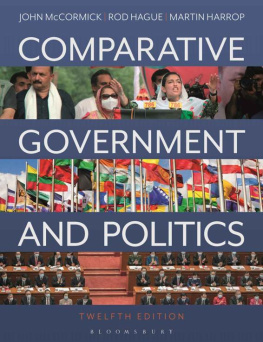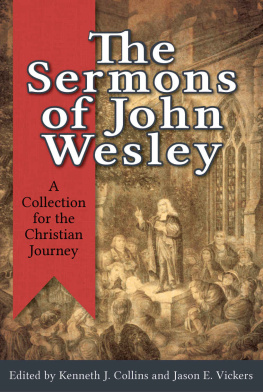John McCormick - Carrots, Sticks and Sermons: Policy Instruments and Their Evaluation
Here you can read online John McCormick - Carrots, Sticks and Sermons: Policy Instruments and Their Evaluation full text of the book (entire story) in english for free. Download pdf and epub, get meaning, cover and reviews about this ebook. year: 2017, publisher: Routledge, genre: Politics. Description of the work, (preface) as well as reviews are available. Best literature library LitArk.com created for fans of good reading and offers a wide selection of genres:
Romance novel
Science fiction
Adventure
Detective
Science
History
Home and family
Prose
Art
Politics
Computer
Non-fiction
Religion
Business
Children
Humor
Choose a favorite category and find really read worthwhile books. Enjoy immersion in the world of imagination, feel the emotions of the characters or learn something new for yourself, make an fascinating discovery.
- Book:Carrots, Sticks and Sermons: Policy Instruments and Their Evaluation
- Author:
- Publisher:Routledge
- Genre:
- Year:2017
- Rating:5 / 5
- Favourites:Add to favourites
- Your mark:
- 100
- 1
- 2
- 3
- 4
- 5
Carrots, Sticks and Sermons: Policy Instruments and Their Evaluation: summary, description and annotation
We offer to read an annotation, description, summary or preface (depends on what the author of the book "Carrots, Sticks and Sermons: Policy Instruments and Their Evaluation" wrote himself). If you haven't found the necessary information about the book — write in the comments, we will try to find it.
Carrots, Sticks and Sermons: Policy Instruments and Their Evaluation — read online for free the complete book (whole text) full work
Below is the text of the book, divided by pages. System saving the place of the last page read, allows you to conveniently read the book "Carrots, Sticks and Sermons: Policy Instruments and Their Evaluation" online for free, without having to search again every time where you left off. Put a bookmark, and you can go to the page where you finished reading at any time.
Font size:
Interval:
Bookmark:
STICKS &
SERMONS
edited by Ray C. Rist
edited by Andrew Gray, Bill Jenkins, and Bob Segsworth
edited by Frans L. Leeuw, Ray C. Rist, and Richard C. Sonnichsen
edited by Olaf Rieper and Jacques Toulemonde
edited by John Mayne and Eduardo Zapico-Gofii
by Evert Vedung
edited by Marie-Louise Bemelmans-Videc,
Ray C. Rist, and Evert Vedung
edited by Richard Boyle and Donald Lemaire
edited by Jan-Eric Furubo, Ray C. Rist, and Rolf Sandahl
edited by Andrew Gray, Bill Jenkins, Frans Leeuw, and John Mayne
STICKS &
SERMONS
& Their Evaluation

Policy Instrument Choice and Evaluation
- the socioeconomic theories that mainly argue that nations respond to the general processes of economic growth and social modernization with basically similar policies;
- the cultural values approach with special emphasis on the deeply embedded cultural ideas arising from the distinctive historical experiences of nations, such as the tradition of laissez-faire liberalism of Anglo-Saxon nations, the statist paternalism of Continental European countries, or the familial quality of organizational life in Japan;
- the political class struggle model where the fundamental dynamic of policy development is seen to lie in the contest between business forces driven by the imperatives of capitalist accumulation on the one hand, and workers and their representatives on the other;
- the neo-corporatist framework emphasizing the broader system of interest representation and its linkages to government through institutionalized bargaining. The capacity to frame, coordinate, and successfully implement policy is seen to be dependent on strongly organized interest blocs (labor, employer, professional, and so on) that are continually engaged in centralized negotiations with government on policy matters of mutual interest; and,
- the institutional-political process perspective: while other frameworks tend to treat policy as the result of outside pressures (socioeconomic, party demands, interest blocs, and so on) on government, institutional analysts put the state at center stage, paying particular attention to distinctive historical patterns in the formation of the nation-state, the way structures and capacities interact with other social actors and the feedback effects of policy on political alliances, party competition and other features of the policy-making landscape.
Font size:
Interval:
Bookmark:
Similar books «Carrots, Sticks and Sermons: Policy Instruments and Their Evaluation»
Look at similar books to Carrots, Sticks and Sermons: Policy Instruments and Their Evaluation. We have selected literature similar in name and meaning in the hope of providing readers with more options to find new, interesting, not yet read works.
Discussion, reviews of the book Carrots, Sticks and Sermons: Policy Instruments and Their Evaluation and just readers' own opinions. Leave your comments, write what you think about the work, its meaning or the main characters. Specify what exactly you liked and what you didn't like, and why you think so.













